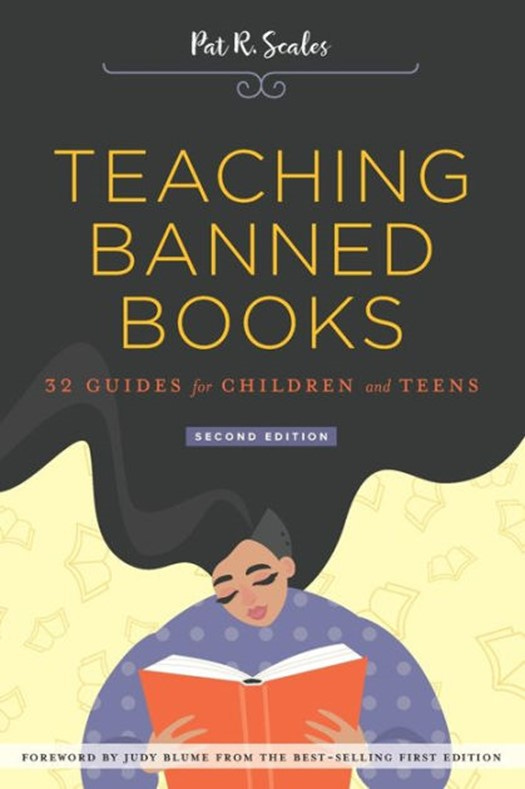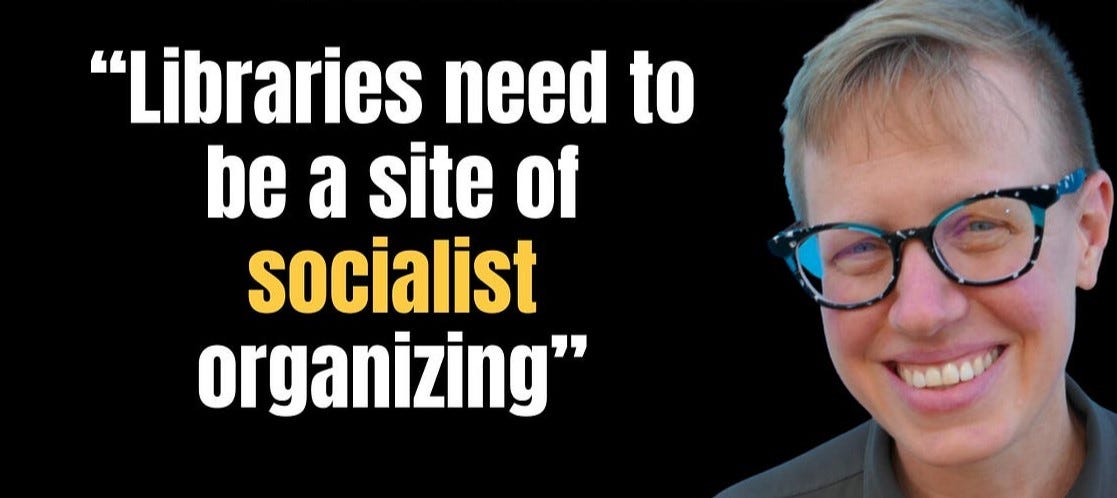"Have Yourself a Marxist Little Library"
Season’s Greetings from the American Library Association
When I first saw the cover of the American Library Association’s “Winter Wishlist and Gift Guide,” I thought for a moment that I had received a catalog from L.L.Bean or Land’s End. The pages burst with the sort of holiday imagery common in catalogs that sell outdoor gear and clothing: evergreen trees topped with freshly fallen snow, strings of colorful lights, people enjoying winter activities, etc. What possible connection this imagery might have with the books being promoted in this “gift guide” is unclear. Why anyone would consider these books as gifts for library staff is a similarly difficult question to answer. The truth is that this ALA catalog highlights books that further indoctrinate library staff in a Marxist agenda. They will ultimately be purchased by woke collection development librarians using taxpayer dollars. The whimsical use of promotional material resembling a holiday gift guide to accomplish this goal cannot disguise the insidious purpose of the American Library Association.
Before describing the disturbing contents of this catalog, I should first explain an interesting twist to this story—one of the titles that is included in this promotional material is a book that I am actually the author of: The College Student’s Research Companion. I wrote this book for a different publisher back in the 1990s to serve as an objective and informative guide for college freshmen explaining how to effectively use library resources. That publisher, Neal-Schuman, went out of business, and all of its assets, including my book, were acquired by the American Library Association. I had gotten in the habit of updating the book every few years, so I proposed a sixth edition to the ALA publishing department back in 2021 before I knew much about the true mission of this organization. It was precisely because of my involvement with the publishing branch of ALA that I became aware of this organization’s Marxist agenda. So in a roundabout way, this Substack newsletter owes its existence to my being an ALA author. I can’t help but feel somewhat embarrassed to have my own book included in this catalog and somewhat confused because the audience for it is college students rather than library staff. Rest assured that there is absolutely nothing woke about my book.
A large percentage of the few dozen other books included in the catalog, however, are clearly the sort of woke material that should surprise no one familiar with the ALA’s obviously Marxist agenda. Featured on the cover, which displays the playful image of a cart full of books, is a volume called Teaching Banned Books. The purpose of this title is exposed in its description inside the catalog: “to spearhead teacher-student-librarian collaborations for intellectual freedom.” The term “intellectual freedom” is used frequently in the catalog, of course, as are the perennially controversial topics of censorship and book “banning” that we have all come to expect from the ALA.
A similar item, Read These Banned Books is described on page two as a title that will enable you “to have fun while on the mission of anti-censorship activism.” Also featured further along, Books under Fire will help you “to explore a cross-section of frequently targeted titles and tactics for defending them.” While these titles made me shake my head in frustration as always, none of them was particularly surprising; nor was I shocked by the inclusion of the book, LGBTQIA+ Books for Children’s and Teens, advocating the creation of “safer, warmer, and more welcoming spaces for young readers.”
Where I did begin to raise my eyebrows higher than usual was when I saw The Librarian’s Guide to Bibliotherapy featured on the front cover, the purpose of which is “to connect patrons to books that will heal them.” The pithy blurbs about each book in this catalog are supplemented with more detailed information accessible by clicking on the covers and going to the ALA website (the links provided in this article also go to those specific webpages). According to its webpage, this “bibliotherapy” guide “will help librarians support the mental health and personal growth of their patrons” and “demonstrates how bibliotherapy-inspired initiatives can address the needs of diverse communities, thus advancing libraries' commitment to EDISJ.”
EDISJ? I had never seen that acronym before, but after a quick Google search which mostly brought up library websites, I learned that it stands for “equity, diversity, inclusion, and social justice,” so it’s basically a new spin on the acronym DEI with an added social justice twist. Apparently, the ALA sees a great need for a fresh new acronym to convey its woke agenda. According to the EDISJ Committee of ALA’s public library division (PLA), libraries are horribly racist places supporting “systems that oppress, exclude, and harm Black people, indigenous people, and people of color.” Furthermore, “The library profession remains overwhelmingly white, despite decades of emphasis on diversity and inclusion” and “the profession has largely failed to improve conditions and ensure pathways for advancement among library workers of color.” This EDISJ group is wokely committed “to dismantling white supremacy in libraries and librarianship.”
Aside from the “bibliotherapy” guide, another book which members of the PLA’s EDISJ committee would certainly wish to have underneath their “holiday tree” is also featured on the cover of the current ALA catalog: Hopeful Visions, Practical Actions: Cultural Humility in Library Work. Like EDISJ, the term “cultural humility” was a new one for me, but it left me with a bad gut feeling, so I did a little research. According to a National Affairs article, cultural humility is “a social-justice agenda grounded in critical theory.” A Psychology Today article further explains that cultural humility pertains to “assessing and responding to things like sexual orientation, ability or disability, gender identity, as well as a variety of other dimensions that are unfortunately characterized by privilege, power imbalance, and injustice.” Bingo! I knew it sounded fishy. The concept of “cultural humility” originated in the health care field and migrated into higher education before more recently taking its place within the ALA agenda. According to the ALA wishlist/gift guide, the intent of Hopeful Visions, Practical Actions: Cultural Humility in Library Work is “to inspire a new generation of action-oriented EDISJ changemakers.”
Another ALA publication, simply called Cultural Humility, encourages readers “to make recognizing and addressing structural inequities in libraries their life’s work.” The more detailed description on the ALA website reveals much more about this “lifelong practice that can guide library workers in their day-to-day interactions by helping them recognize and address structural inequities in library services.” Apparently, this ideology is “emerging as a preferred approach to diversity, equity, and inclusion (DEI) efforts within librarianship” asking “us to recognize the limits to our knowledge, reckon with our ongoing fallibility, educate ourselves about the power imbalances in our organizations, and commit to making change.” The ALA encourages librarians to read this book to “understand how it [cultural humility] intersects with … critical race theory” and how this “culturally humble approach supports DEI work” and upholds a “commitment to challenging inequitable structures of power.” The blatant Marxist ideology conveyed by this description is deeply concerning.
Not to be overlooked in the ALA winter catalog is a terrifying book entitled Decolonial Archival Futures, the dystopian Ministry-of-Truth-like purpose of which is “to change how historical knowledge is produced, communicated, and preserved.” According to the more detailed webpage description, “decolonial archival practices involve thinking about and consciously changing how historical knowledge is produced, communicated, and preserved.” Decolonial Archival Futures encourages readers to consider “which histories we tell, and how the past is presented.” In other words, this book instructs librarians not to convey an objective perspective on history, but to formulate a narrative that supports a woke ideology.
To disguise the books featured in ALA’s winter catalog as gifts that should be given during the holiday season is incredibly odd. While this catalog is certainly full of books that Marxist ALA President Emily Drabinski would love to see under the “holiday trees” of every ALA member, it provides yet another wake-up call revealing the urgency of reclaiming our hijacked libraries from this insidious organization. What should truly be on our “wishlist” is the eradication of the American Library Association!












Thanks for sharing this resource you found. It is clear that the ALA has been thoroughly captured and there is little choice but to defund them and the colleges that provide an ALA MLS.
That's a fantastic round up of reading material for the cultists. Thank you sharing your inside info with us.